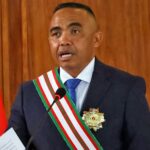Armed with sub-machine guns and often masked as they patrol Uganda’s streets, members of the elite Special Forces Command (SFC) are increasingly viewed not as a national military unit, but as a private army serving the interests of President Yoweri Museveni and his powerful family. As the 81-year-old leader prepares to seek re-election next year, fears are mounting that the SFC will once again be used to suppress opposition voices and guarantee his continued grip on power.
President Museveni, who has ruled Uganda since 1986 after leading a successful guerrilla war, has won multiple elections over nearly four decades—each one shadowed by accusations of fraud, intimidation, and violence. Critics say he has transformed Uganda into a de facto monarchy, where power flows through family lines and loyal military networks rather than democratic institutions.
The Special Forces Command, long commanded by Museveni’s son, General Muhoozi Kainerugaba, lies at the heart of this system. Initially created to protect the president and key state installations, the SFC has evolved into Uganda’s most powerful and feared security force—one that analysts say now rivals the national army in strength, influence, and autonomy. The unit’s motto, “There is no substitute for loyalty,” underscores its allegiance to the Museveni family rather than to the state itself.
Observers and insiders describe the SFC as a “shadow army within the army,” directly answerable to the president and his son. It has been accused of abducting, torturing, and killing opposition figures, allegations that the unit consistently denies. Yet numerous testimonies from activists, human rights groups, and even former soldiers suggest otherwise. The BBC reports that SFC soldiers have been implicated in extrajudicial killings and abductions, including the high-profile detention of opposition leader Bobi Wine’s bodyguard, Edward Sebuufu, who was allegedly held and mocked by Gen Kainerugaba himself.
Critics argue that the growing power of the SFC poses a grave threat to Uganda’s political stability. The unit’s dominance has sparked tension within the military hierarchy, particularly among veteran commanders who fought alongside Museveni in the 1980s and now resent the preferential treatment given to the president’s son and his loyalists. Sources claim that promotions within the SFC often favour officers from Museveni’s own Banyankore ethnic group, deepening divisions in the army and fuelling perceptions of ethnic bias.
General Muhoozi Kainerugaba, now 51 and serving as Chief of Defence Forces, has been openly groomed as his father’s successor. Known for his controversial social media presence, he has previously made inflammatory remarks—once joking about invading Kenya, to the alarm of regional leaders. Despite government attempts to downplay such statements as “banter,” his influence remains unquestionable. He is believed to retain de facto control of the SFC even after his promotion, with current commander Major General David Mugisha reportedly taking direct orders from him.
Under Kainerugaba’s leadership, the SFC has grown to an estimated strength of over 10,000 troops—highly trained, heavily armed, and better funded than any other branch of Uganda’s military. The unit is tasked with protecting critical national assets such as oil fields, airports, and presidential residences. It has also been accused of cross-border operations, including the controversial 2023 abduction of opposition figure Kizza Besigye from Kenya back into Uganda to face treason charges.
The Ugandan government recently passed legislation formally recognizing the SFC as one of the country’s four official military services, alongside the land forces, air force, and reserve units. Opposition lawmakers condemned the move, arguing that it legitimizes a force they describe as unconstitutional and politically motivated. “The new law validates an entity that has been operating illegally,” said opposition MP Ibrahim Ssemujju Nganda.
Analysts warn that the institutionalization of the SFC reflects a deeper militarization of the Ugandan state. Dr. Gerald Bareebe, a Ugandan political scholar at York University, told the BBC that the SFC’s “core function is to guarantee regime survival by suppressing both internal dissent and external threats.” He cautioned that its rise could one day lead to a confrontation with the regular army—an outcome reminiscent of Sudan’s ongoing civil war between its military and the former paramilitary Rapid Support Forces (RSF).
Despite growing unease, Museveni continues to defend the SFC, insisting it was created “for the good of Uganda” and dismissing critics as “enemies of progress.” Yet, the optics of an entrenched family dynasty are hard to ignore. Museveni’s wife, Janet, serves as Minister of Education; his son commands the military; and his grandson recently joined the army, symbolizing the continuity of the family’s control over Uganda’s power structures.
For many Ugandans, the future appears uncertain. As opposition leader Robert Kyagulanyi, better known as Bobi Wine, prepares to challenge Museveni again in the 2026 elections, fears persist that the SFC will be deployed to crush dissent, just as it was during the 2021 campaign. “It’s a torture squad, not a security unit,” Bobi Wine has said, echoing widespread frustration among citizens who feel trapped under a regime fortified by guns, fear, and family loyalty.
As Museveni edges closer to four decades in power, Uganda’s fragile democracy faces its most critical test yet. The growing militarization of politics, deepening nepotism, and consolidation of power within the SFC have raised the spectre of instability in a post-Museveni era. Whether the country’s next chapter will bring reform, repression, or rebellion remains to be seen but one thing is clear: the shadow of the Special Forces Command looms large over Uganda’s political future.












Leave a comment